Key takeaways:
- Questions can transform group dynamics by fostering deeper conversation and collaboration, as demonstrated in various workshops.
- Open-ended and well-timed questions enhance participant engagement and encourage diverse perspectives, leading to richer discussions.
- Effective questioning techniques, such as the “5 Whys,” help uncover deeper insights and motivations, turning workshops into communities of problem solvers.
- Personal reflections and shared experiences revealed through questions can create an environment of trust and vulnerability, enhancing the overall impact of workshops.
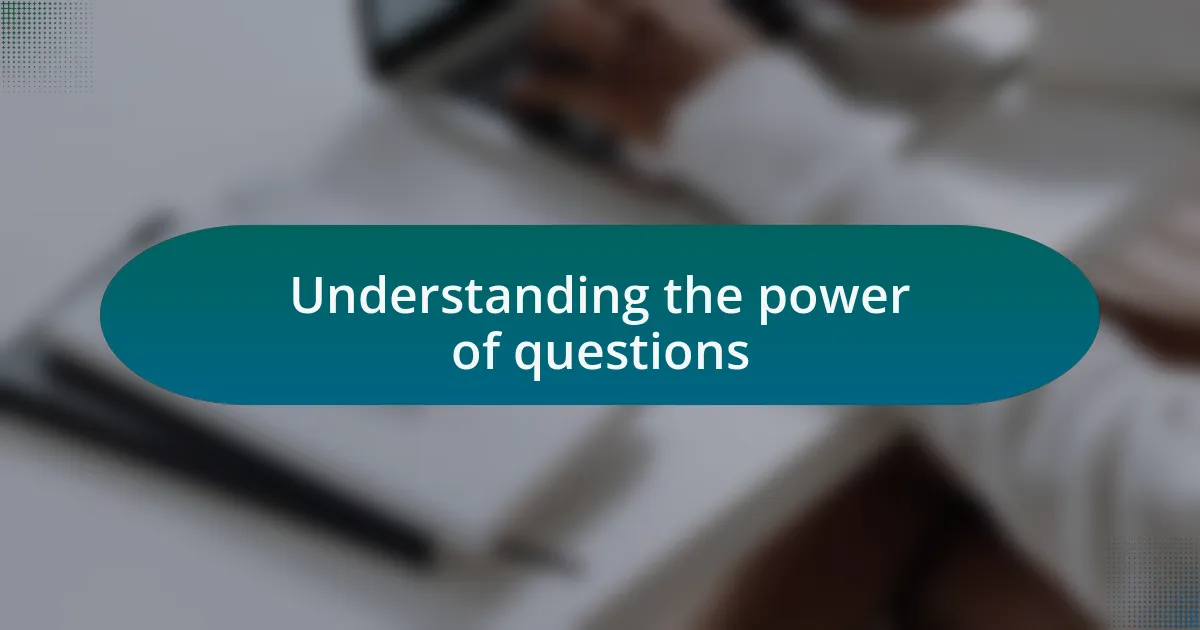
Understanding the power of questions
Questions are powerful tools that can unlock new perspectives and encourage deeper thinking. I remember a workshop where I asked participants, “What if our biggest challenge was actually our best opportunity?” The room buzzed with energy, and it transformed the discussion into an exploration of innovative solutions. This simple inquiry opened up avenues of creativity that many hadn’t considered.
In my experience, asking the right question at the right moment can profoundly shift the dynamics of a group. For instance, during a tech innovation session, when I posed the question, “How can we leverage our failures for future success?” the atmosphere changed instantly. People began to share their setbacks, and through that vulnerability, a rich dialogue emerged. It highlighted the importance of creating an environment where questions lead to authentic conversations.
Have you ever noticed how a well-timed question can make all the difference? When I facilitate workshops, I often find that the most impactful discussions arise from questions that resonate with participants’ experiences. I’ve seen firsthand how a simple question can foster collaboration, making every voice feel valued. It’s about connecting with the audience—not just talking at them.

Importance of questions in workshops
In my experience, the art of questioning not only drives engagement but also cultivates a sense of ownership among participants. I once led a workshop where I threw out the question, “What change do you want to see in our tech community?” The responses varied widely, unveiling individual hopes and fears, which ultimately shaped the workshop’s direction. It was fascinating to watch as attendees transformed from passive listeners into active contributors, fueled by their own aspirations.
Questions serve as bridges, connecting disparate ideas and fostering collaboration. I remember a particularly dynamic session where I asked, “What unspoken barriers do we face in adopting new technologies?” As people unpacked their thoughts, they not only identified issues but also began to brainstorm collective solutions. This dialogue wasn’t just about problem-solving; it created a shared understanding that strengthened relationships within the group.
Have you ever thought about how powerful it is to have your voice heard? I find that when I encourage participants to pose their questions, the collective intelligence of the group shines through. During one workshop, a participant asked, “What if we dared to be more experimental with our projects?” This question ignited a series of conversations that pushed us beyond conventional thinking. It’s a reminder that when we prioritize questions, we unlock the door to creativity and collaboration, making every workshop a unique journey of discovery.
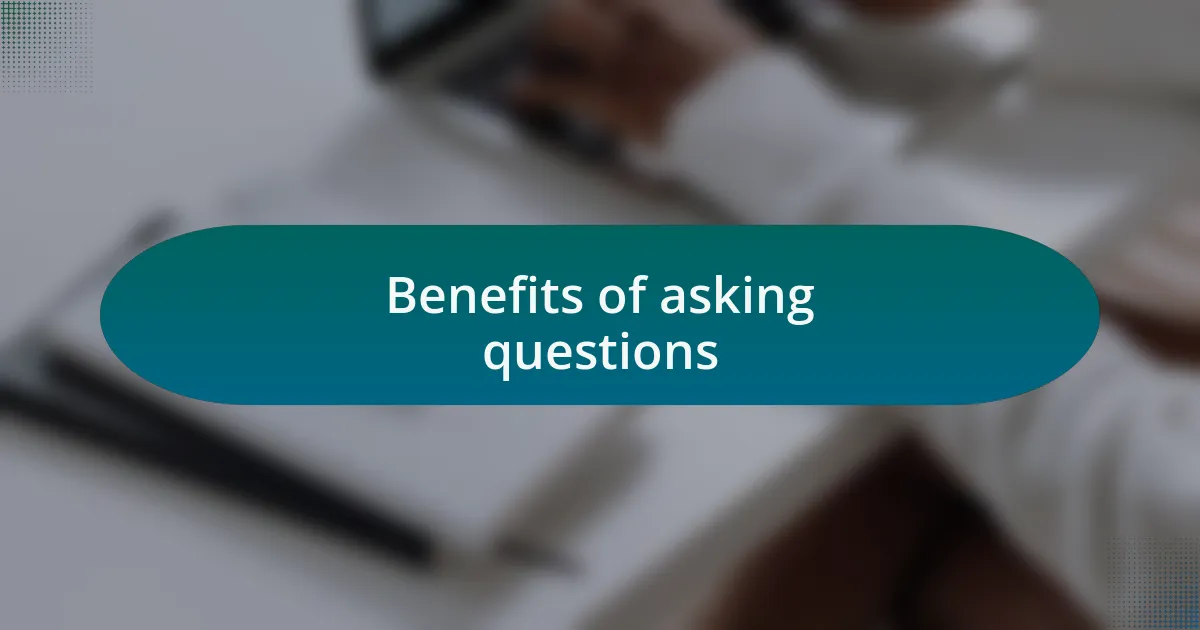
Benefits of asking questions
Asking questions can often serve as a catalyst for deeper understanding and insight. I remember a particular moment in a workshop where I asked, “How would this technology impact your daily work?” That simple shift prompted attendees to reflect on personal applications, leading to a richer discussion about real-world implications. It’s amazing how a well-placed question can transform abstract concepts into something tangible and relevant for each participant.
Moreover, questions can illuminate hidden perspectives and ensure that diverse voices are heard. During a recent session, I posed the question, “What assumptions do we carry into our tech projects?” This inquiry unveiled misconceptions that had been lingering beneath the surface. The revelations were eye-opening and fostered an environment of vulnerability where participants felt comfortable sharing their true thoughts.
Have you considered how questions can empower individuals to express their fears and aspirations? I often marvel at the way an open question, such as “What challenges do you foresee in your tech journey?” invites honesty and camaraderie. It’s remarkable to see individuals connect over shared struggles, creating a supportive atmosphere where everyone feels valued. The benefits of asking questions extend far beyond the immediate conversation; they can build a foundation for continued dialogue and collaboration long after the workshop concludes.
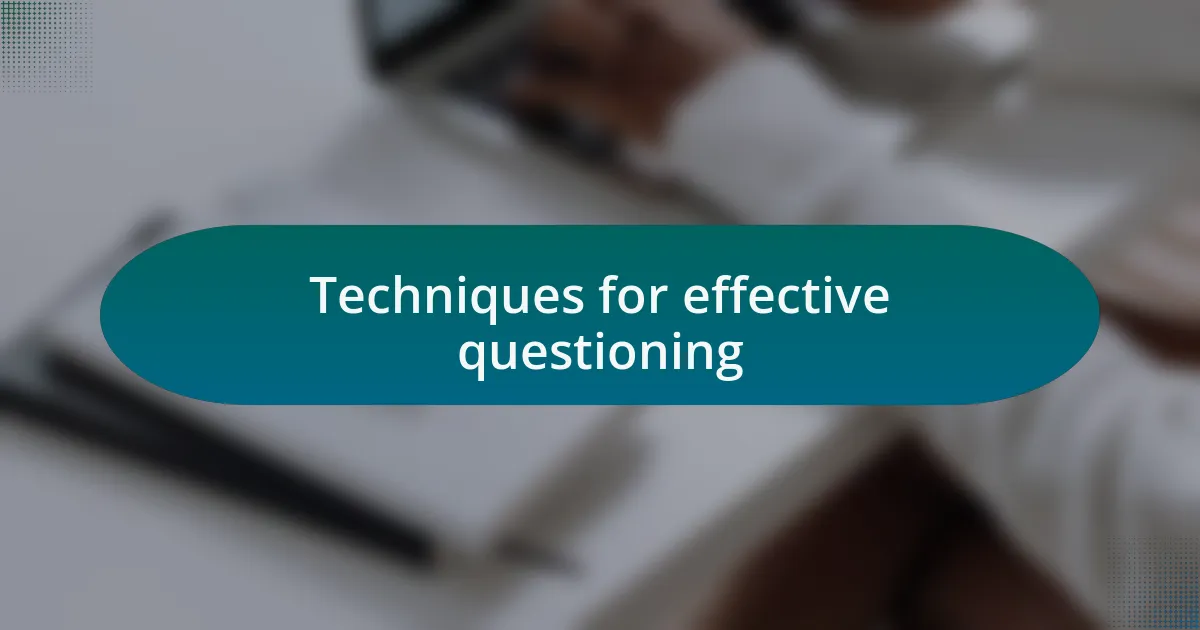
Techniques for effective questioning
When it comes to effective questioning, I’ve found that timing is everything. In one workshop, I waited until the group settled into the material before asking, “What’s your initial reaction to this new technology?” The responses flowed so naturally; timing made participants feel ready and willing to share their thoughts. I realized that well-timed questions can enhance engagement significantly.
Another technique I’ve adopted is the use of open-ended questions that allow for multiple perspectives. For instance, instead of asking “Do you like this software?”, I once prompted the group with “What do you think are the strengths and weaknesses of this software?”. This shift invited a wider range of opinions and insights. It’s fascinating how a slight rephrasing can encourage a more dynamic exchange, revealing insights I hadn’t considered.
Finally, I often incorporate the “5 Whys” technique when delving deeper into a topic. By consistently asking “Why?” in response to earlier answers, I’ve uncovered the root causes of certain challenges well beyond the surface level. This method has helped participants not only explore their reasoning but also gain clarity on their own motivations. Isn’t it intriguing how sometimes the most profound insights come from just peeling back the layers of a simple answer?
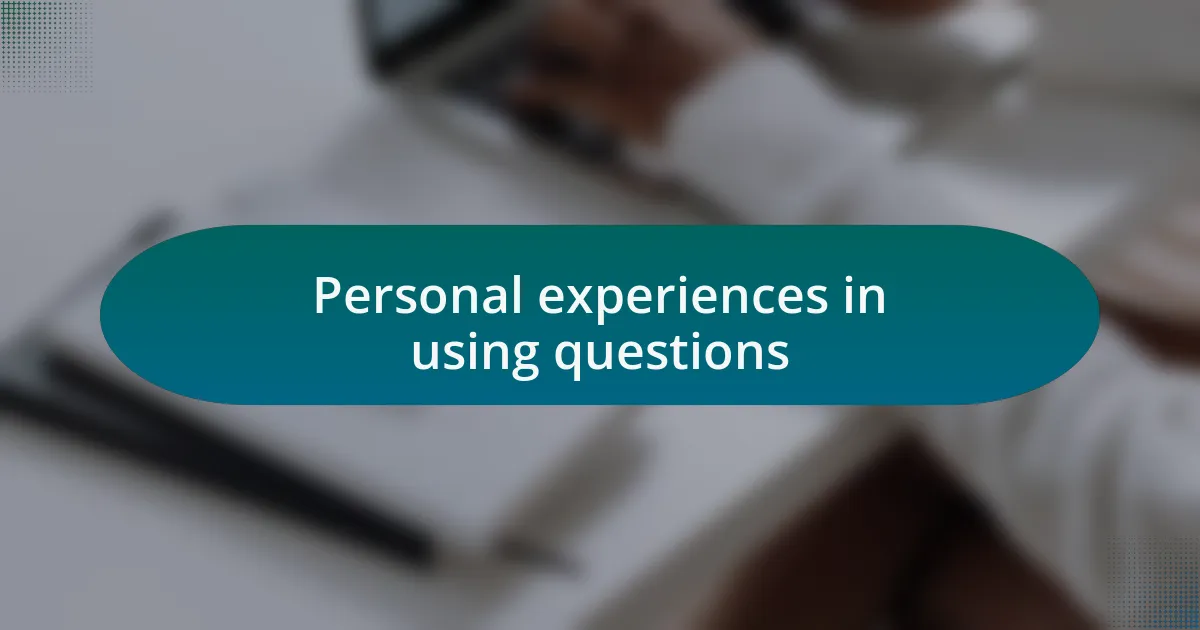
Personal experiences in using questions
In my experience, I’ve discovered that asking questions can completely transform the energy in a workshop. During one session, I posed a question that seemed simple on the surface: “How does this technology affect your day-to-day work?” The room buzzed with excitement as participants connected their personal experiences with the topic. It felt rewarding to witness them reflect, realizing that their work life was intertwined with the concepts we were discussing.
I remember a particularly eye-opening moment when I asked, “What solutions can we brainstorm together for the challenge you’ve just mentioned?” The shift from criticism to collaborative problem-solving seemed almost magical. It was as if the participants found their voices in that moment, rallying together to offer support and ideas. Isn’t it amazing how the right questions can turn a workshop into a community of problem solvers?
I’ve also noticed that the power of questions lies in their ability to reveal hidden emotions. After asking a group, “What are your biggest fears around implementing this new technology?”, I saw a vulnerability that surprised me. Participants shared feelings of apprehension and excitement in equal measure. It dawned on me that by creating a safe space for dialogue, I was not only facilitating learning but also fostering trust. Don’t you think that’s what makes a workshop truly impactful?
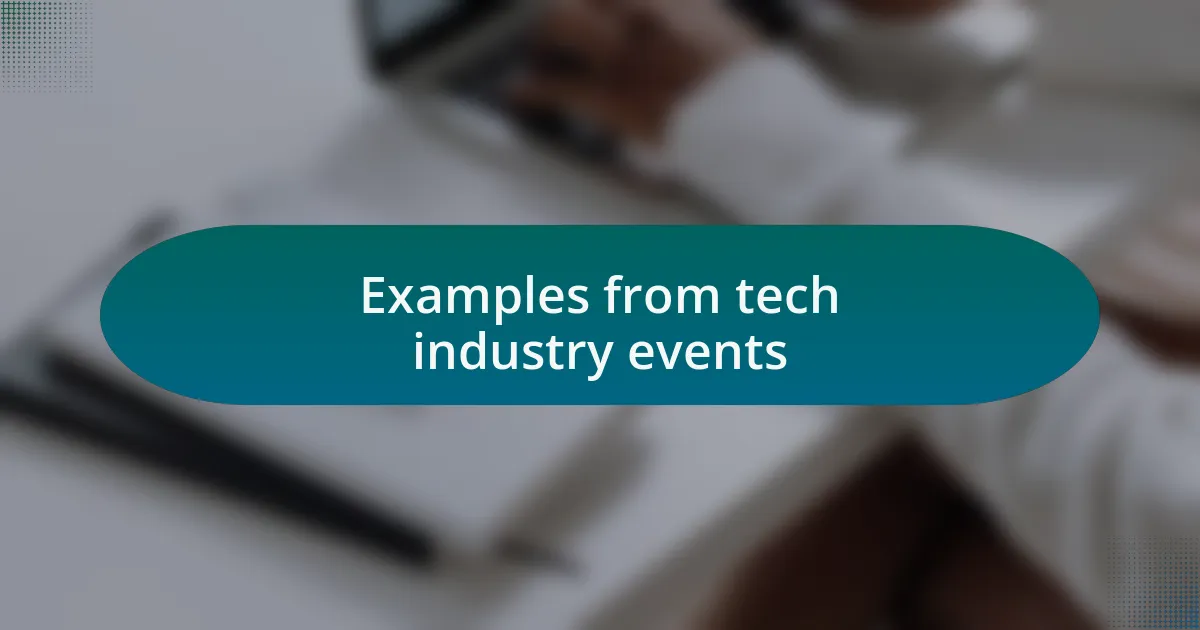
Examples from tech industry events
At a recent tech conference, I initiated a breakout session with the question, “What do you believe is the biggest barrier to adopting emerging technologies in your organization?” The varied responses painted a vivid picture of how each participant’s environment influenced their perspective. It was enlightening to hear the multitude of challenges, from cultural resistance to resource limitations. How often do we overlook the individual experiences that shape our collective understanding?
During a panel discussion, I took a risk and asked the audience, “What was a defining moment in your tech journey that changed your viewpoint on innovation?” The stories that flowed from that question were profound. One participant shared how a failed project turned into a launchpad for future successes, emphasizing resilience in the face of setbacks. Isn’t it powerful how such personal revelations can build connectivity and empathy among us?
In another workshop, I used the question, “How would you redefine success in your tech projects?” to spark a discussion around personal and professional values. It was remarkable to witness participants challenge standard metrics of success. By redefining this concept, they were able to align their goals with what truly mattered to them as individuals and professionals. Don’t you find that redefining success can liberate creativity in ways that traditional metrics simply cannot?